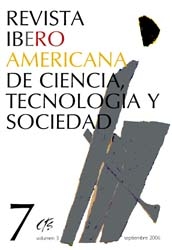The research community and science and technology policy
Looking at advanced countries
DOI:
https://doi.org/10.52712/issn.1850-0013-963Keywords:
research community, science and technology policy, social studies of science and technology, policy analysis, developed countriesAbstract
The work approaches the perception of advanced countries researchers who analyze the transformation in course in the research and higher education institutions concerning the research community’s role (vis-à-vis the bureaucrats and entrepreneurs) in their policy making process. Its objective, besides providing an updated panoramic vision on the theme for Latin-American colleagues, is to show that many of our community’s characteristics seem to be equally present, sometimes in a lessened way, in those countries. It is hoped that it could contribute to a more adequate consideration of these characteristics in the elaboration of the science and technology policy of our countries.
Downloads
References
AUFDERHEIDE, E. (2001): “The Role of Science Councils as advisory bodies in national science policy priority setting”, in: Siune, K, (coord.) (2001).
BACHRACH, P. e BARATZ, M.S. (1962): “Two faces of power”, American Political Science Review, nº 56.
BERTILSSON, M. (2001): “From Honoratiores to Bureaucrats: Research Counceling in transition”, in: Siune, K. (coord.) (2001).
BOUDOURIDES, M. (2001): “The politics of technological innovations: network approaches international”, Summer Academy on Technological Studies User Involvement in Technological Innovation, Austria: Deutschlandsberg, July 8-14.
BRONCANO, F. (1995): Mundos artificiales: filosofía del cambio tecnológico, Mexico, Paidós.
DAGNINO, R. (2004): “A Relação Pesquisa-Produção: em busca de um enfoque alternativo”, em Santos, L. et al. (2004): Ciência, Tecnologia e Sociedade: o desafio da interação, Londrina, IAPAR, pp. 103-146.
DAGNINO, R. (1997): “Identificação de prioridades de P&D e objetivos nacionais nos países da OECD: tempo de reabrir o debate?”, Planejamento e Políticas Públicas, vol. 16, Brasília, IPEA, pp. 137-162.
DAGNINO, R. (2002): “Enfoques sobre a relação Ciência, Tecnologia e Sociedade: Neutralidade e Determinismo”, em Organização dos Estados Ibero-americanos para a Educação, a ciência e a cultura, Sala de Lectura CTS+I de la OEI. (Disponível em http://www.campus-oei.org/salactsi/index.html)
DAGNINO, R. (2005): “Enfoques empregados nos países avançados para a análise da Política de Ciência e Tecnologia”, DPCT/UNICAMP.
ETZKOWITZ, H. (1989): “Entrepreneurial science in the academy: a case of transformation of norms”, Social Problems, vol. 36, no. 1, pp. 14-29.
ETZKOWITZ, H. e LEYDESDORFF, L. (eds.) (1997): Universities and the global knowledge economy: a triple helix of university-industry-government relations, London, Cassell Academic.
FEENBERG, A. (2002): Transforming Technology, London, Oxford University Press.
GARDINER, M. (2001): Setting the Research Agenda - the industrial/commercial perspective.
GIBBONS M. et al. (1994): The new production of knowledge. The dynamics of science and research in contemporary societies, London, Sage.
GRONBAEK. D. (2001): “Adapting Research Councils to Strategic Priority-Setting: The Case of Denmark”, in: Siune, K. (coord.) (2001).
GUSTON, D.H. e KENISTON, K. (eds.) (1994): The Fragile Contract, Cambridge and London, MIT Press.
HAM, C. e HILL, M. (1993): The Policy Process in the Modern Capitalist State, New York, Harvester Wheatshesf.
HOPPE, R. (1999): “Policy analysis, science and politics: from ‘speaking truth to power’ to ‘making sense together’”, Science and Public Policy, vol. 26, no. 3.
JASANOFF, S. (2000): Science and Governance: The US Experience, IPTS Report, vol. 45.
LACEY, H. (1999): Is science value-free?: values and Scientific Understanding, London, Routledge.
LANGBERG, K. (2001): ‘Researchers’ reactions to and perceptions of policymaking instruments.
MERTON, R. (1980): “Los Imperativos Institucionales de la Ciencia”, em Barnes, B.(ed.): (1980): Estudios de Sociología de la Ciencia, Madrid, Alianza.
MORRIS, N. (2001): “The effect of Research Council policies on researchers choices”, in: Siune, K. (coord.) (2001).
NOWOTNY, H. et al. (2001): Re-Thinking Science. Knowledge and the Public in an Age of Uncertainty, Cambridge, Polity Press & Blackwell Publishers Inc.
SABATIER, P. e MAZMANIAN, D. (1979): “The Conditions of Effective Implementation: A Guide to Accomplishing Policy Objectives”, Policy Analysis, vol. 5, no. 4.
SCHMIDT, E. (2003): Science and Society - Building Bridges of Excellence Perceptions on the Interaction between Public Research and Enterprises.
SIUNE, K. (coord.) (2001): Science Policy. Setting the Agenda for Research. Proceedings from MUSCIPOLI Workshop One, Aarhus, The Danish Institute for Studies in Research and Research Policy.
SIUNE, K. e AAGAARD, K. (2003): “Science policy as a frame for cross disciplinary research”, in: Research Management Processes under Rapid Change, Report from The Danish Institute for Studies in Research and Research Policy.
SKOIE, H. (2001): The Research Councils in the Nordic Countries. Developments and Some Challenges.
WEBSTER, A.J. e ETZKOWITZ, H. (1991): Academic-industry relations: the second academic revolution?, London, Science Policy Support Group (SPSG concept paper no. 12).
WHITELEGG, K. (2003): “The transformation of scientific advisory structures in the unifying Europe: A comparison of recent developments in Hungary and Austria”, in: Paper for the Innovation in Europe: Dynamics, Institutions and Values, Roskilde, May 8-9.
WILDAVSKY, A. (1979): Speaking Truth to Power: The Art and Craft of Policy Analysis, Boston, Little Brown.
ZIMAN, J.M. (1990): “What is happening to science?”, in: Cozzens, S. et al. (eds.)(1990): The research system in transition, Dordrecht, Kluwer Academic, pp. 23-33.
Downloads
Published
How to Cite
Issue
Section
License
Copyright (c) 2025 CC Attribution 4.0

This work is licensed under a Creative Commons Attribution 4.0 International License.
All CTS's issues and academic articles are under a CC-BY license.
Since 2007, CTS has provided open and free access to all its contents, including the complete archive of its quarterly edition and the different products presented in its electronic platform. This decision is based on the belief that offering free access to published materials helps to build a greater and better exchange of knowledge.
In turn, for the quarterly edition, CTS allows institutional and thematic repositories, as well as personal web pages, to self-archive articles in their post-print or editorial version, immediately after the publication of the final version of each issue and under the condition that a link to the original source will be incorporated into the self-archive.











